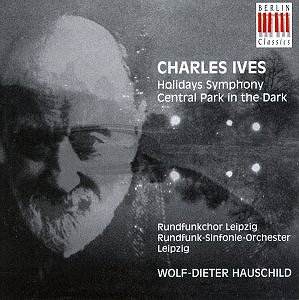Charles Ives’ music can still appear to be so very
shocking and original. It is easy to forget that he developed and changed
his language after he turned thirty. Many hearing his name think of
his later music. The later Ives is the composer of polytonal, polyrhythmic
works with masses of musical quotations piled on top of each other.
However there is another side to him; at least one.
It took me many years to realize that Ives is almost
entirely a composer of nostalgia. Everything he writes from about 1905
onwards, when he was just about thirty, is a reminiscence of his childhood
in an America fast disappearing. This was the pioneering America of
marching bands and evangelical hymns. This was also a land in which
childhood imagination was still fresh and in which the dark seemed to
be from another planet.
In his Third Symphony ‘The Camp Meeting’, started
in 1904, Ives weaves hymns into each other in an atmosphere of ‘Old
Folks gathering’ or ‘First Communion’. The melodies are recognizable,
tonal and placed carefully in a fairly conventional harmonic framework.
In the ‘Holidays’ symphony (1911-16) and in ‘Central Park in the Dark’
(1906) the basic harmony is bitonal or polytonal. Unrelated chords float
by in polyrhythms. A disembodied jazz band haunts the distant landscape.
Others appear. They play differing melodies at the same time. The sound
builds, reaches a climax of polymelody and suddenly, as if a light is
switched off, all ends. The original atmosphere, normally a bed of bitonal
string chords, continues as if nothing had ever happened. It is as if
Ives’ imagination increases in strength, like a conversationalist who
says "do you remember so and so … and what about him … oh and then
we had … but the …". Suddenly realizing that he is rambling he
stops, becomes aware of those around him and the imagination is lost
and fades. This is the plan of ‘Central Park’, ‘The Fourth of July’
and other works.
Dynamic contrast in Ives can be quite extreme and quite
sudden. It is irritating if the listener has continually to be adjusting
the volume during the course of a ten-minute piece. One moment it is
too quiet; the next the neighbours are complaining. This is the problem
which it seems to me haunts the recording by Michael Tilson Thomas with
the Chicago Symphony Orchestra, recorded for CBS Masterworks in 1986
and now available on Sony. The orchestral playing is the best on disc
but the volume is at too low a level and when turned up sounds scratchy.
The bells in ‘Washington’s birthday’ are just too distant. This newly
released recording from 1982 does not suffer from this problem. Nevertheless
listening on headphones is best especially if they have their own volume
control as adjustment may still be necessary. At the main climax of
‘The Fourth of July’ the sound in this Eterna recording is slightly
congested. Generally however the recording is immediate and clear. The
orchestral playing is excellent.
Ives was not bothered about practicality. In the 4th
Symphony the chorus enter briefly in Movement 1 and are then silent.
In the Orchestral Set No. 3 they sing at the start only of Movement
3. In the ‘Holidays Symphony’ they are heard for just a few bars in
the 4th movement - over thirty minutes into the work. Nevertheless
they must sound confident and clear. Wolf-Dieter Hauschild extracts
the best from them and the balance between male and female is excellent.
So, to sum up … this is a good disc even if providing
rather short measure. This is a performance of the music that will not
disappoint. The rendering of ‘Central Park in the dark’ a notoriously
complex. It is a difficult score to bring off but here it is carefully
played and most atmospheric. In Hauschild’s ‘Holidays Symphony’ not
a raucous noise is heard from end to end. The music is beautifully and
sensitively played with excellent engineering. Recommended.
Gary Higginson

